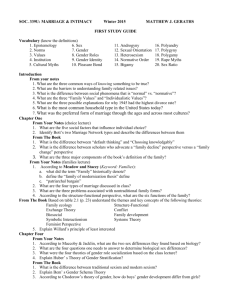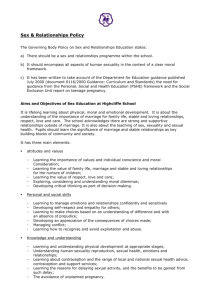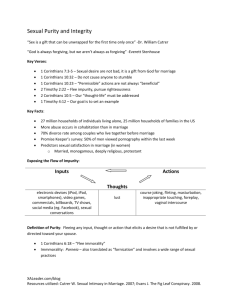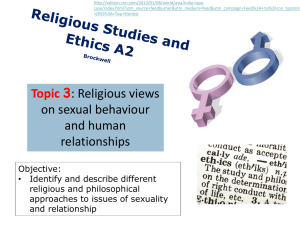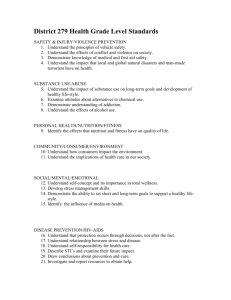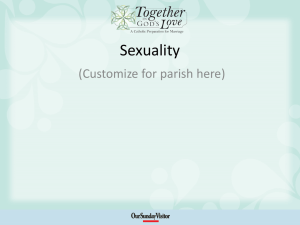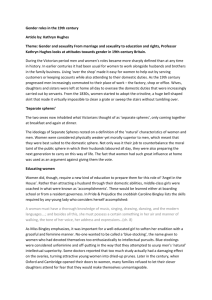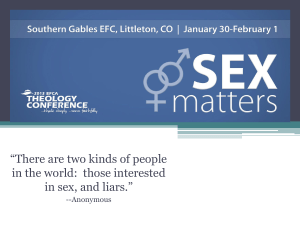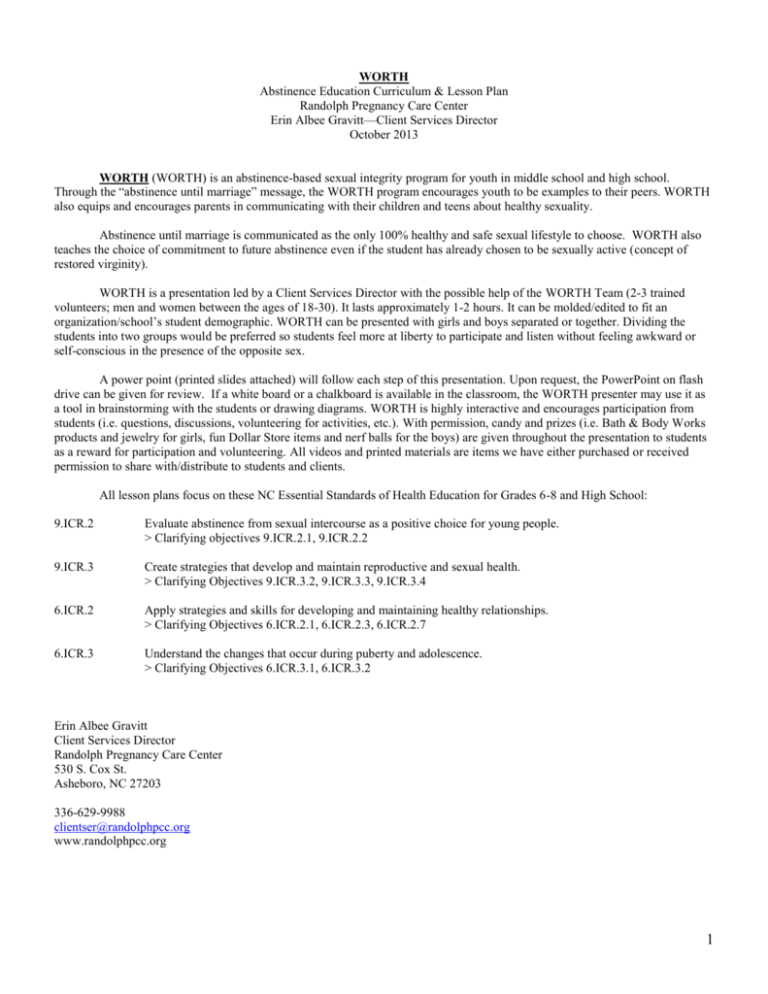
WORTH
Abstinence Education Curriculum & Lesson Plan
Randolph Pregnancy Care Center
Erin Albee Gravitt—Client Services Director
October 2013
WORTH (WORTH) is an abstinence-based sexual integrity program for youth in middle school and high school.
Through the “abstinence until marriage” message, the WORTH program encourages youth to be examples to their peers. WORTH
also equips and encourages parents in communicating with their children and teens about healthy sexuality.
Abstinence until marriage is communicated as the only 100% healthy and safe sexual lifestyle to choose. WORTH also
teaches the choice of commitment to future abstinence even if the student has already chosen to be sexually active (concept of
restored virginity).
WORTH is a presentation led by a Client Services Director with the possible help of the WORTH Team (2-3 trained
volunteers; men and women between the ages of 18-30). It lasts approximately 1-2 hours. It can be molded/edited to fit an
organization/school’s student demographic. WORTH can be presented with girls and boys separated or together. Dividing the
students into two groups would be preferred so students feel more at liberty to participate and listen without feeling awkward or
self-conscious in the presence of the opposite sex.
A power point (printed slides attached) will follow each step of this presentation. Upon request, the PowerPoint on flash
drive can be given for review. If a white board or a chalkboard is available in the classroom, the WORTH presenter may use it as
a tool in brainstorming with the students or drawing diagrams. WORTH is highly interactive and encourages participation from
students (i.e. questions, discussions, volunteering for activities, etc.). With permission, candy and prizes (i.e. Bath & Body Works
products and jewelry for girls, fun Dollar Store items and nerf balls for the boys) are given throughout the presentation to students
as a reward for participation and volunteering. All videos and printed materials are items we have either purchased or received
permission to share with/distribute to students and clients.
All lesson plans focus on these NC Essential Standards of Health Education for Grades 6-8 and High School:
9.ICR.2
Evaluate abstinence from sexual intercourse as a positive choice for young people.
> Clarifying objectives 9.ICR.2.1, 9.ICR.2.2
9.ICR.3
Create strategies that develop and maintain reproductive and sexual health.
> Clarifying Objectives 9.ICR.3.2, 9.ICR.3.3, 9.ICR.3.4
6.ICR.2
Apply strategies and skills for developing and maintaining healthy relationships.
> Clarifying Objectives 6.ICR.2.1, 6.ICR.2.3, 6.ICR.2.7
6.ICR.3
Understand the changes that occur during puberty and adolescence.
> Clarifying Objectives 6.ICR.3.1, 6.ICR.3.2
Erin Albee Gravitt
Client Services Director
Randolph Pregnancy Care Center
530 S. Cox St.
Asheboro, NC 27203
336-629-9988
clientser@randolphpcc.org
www.randolphpcc.org
1
WORTH
Curriculum & Lesson Plan
Table of Contents
I.
Introduction/Welcome
3
II.
Information & Sources
3
III.
Puberty & Sex
3
IV.
Abstinence/Purity
4
V.
Why choose sexual purity?
5
VI.
Love vs. Lust Activity
5
VII.
Responsibilities
5
VIII.
Peer Pressure & Boundaries
5
IX.
Restored Virginity
6
X.
Marriage
6
XI.
Closing/ Q&A
7
XII.
Materials to Take Home
7
2
WORTH
Curriculum & Lesson Plan
I. Introduction/Welcome
1. A brief explanation of who the Randolph Pregnancy Care Center is will be given to students, as well as an overview of
the WORTH learning objectives.
We are a non-profit organization which has educated on healthy sexuality and helped those who are in unplanned
pregnancies for the past 20 years. All of our programs and services are free and confidential as allowed by law.
Some of our services include: pregnancy tests, pregnancy options information, Relationship Reality classes,
Women’s Health Workshop.
2. List the topics that will be covered in the next 90 minutes:
What is healthy sexuality?
Where can we find accurate info?
Myths about sex
Purity/Integrity
Relationships
Boundaries
Responsibilities
Restored Virginity
3. Show video on DVD as a hook: “Swimming with Sharks”.
II. Information & Sources
1. Questions will be posed about information sources, and we will allow for students to share possible answers; open to
limited discussion.
a. Where have you already learned about sex/sexuality?
b. What sources do you think are reliable?
Possible responses:
Family, Friends, School, Sex Ed Class, Health Class, Church, TV, Movies, Songs, Media, etc.
c. What or who is pressuring you to have sex now?
Possible responses:
-Natural desire, need for affection, need to belong, curiosity
-Erotic/Pornographic materials, sexy fashions
-Boyfriend or girlfriends, popular arguments like: Prove you love me, everybody’s doing it, if it feels
good do it, it’s ok if you love each other, it’s ok if you’re ready, it’s ok if you use protection, it’s ok if
you don’t hurt anyone
-Advertisements and commercials that pervert sex
-MTV, song lyrics
-Provocative role models (I.e. Rihanna, Beyonce, Lady Gaga, etc.), TV stars (16 and Pregnant)
-People and companies that profit from sex such as: contraceptive makers; birth control promoters;
pornographers
-Please-me-first Philosophy and the failure of adults to set good examples
d. Explain the difference between someone wanting something FROM you (i.e. Advertisers, media) and people
wanting something FOR you (i.e. Parents/teachers wanting the best for you).
III. Puberty & Sex
3
1.
2.
3.
4.
Puberty
a.
Definition: Puberty is the name for the time when your body begins to develop and change as you move
from kid to adult. We're talking about stuff like girls developing breasts and boys starting to look more like
men. During puberty your body will grow faster than at any other time in your life, except for when you
were a baby.
b.
It helps to know about the changes that puberty causes BEFORE they happen. That way, you know what to
expect. It's also important to remember that everybody goes through these changes. No matter where you
live or whether you're a boy or a girl, you will experience them. No two people are exactly alike, but one
thing everyone has in common is that we all go through puberty.
c.
Usually puberty starts between ages 8 and 13 in girls and ages 9 and 15 in boys. This wide range in ages
may help explain why some of your friends still look like young kids whereas others look more like adults.
d.
When your body is ready to begin puberty, your pituitary gland (a pea-shaped gland located at the bottom of
your brain) releases special hormones. Depending on whether you're a boy or a girl, these hormones go to
work on different parts of the body.
Sexual Health Pre-test
a.
Hand out pre-test about women’s health to girls and men’s health pre-test to guys. Allow students 5 minutes
to fill it out by themselves.
b.
Go over correct answers with them (using The Answer Keys).
Reproductive systems
a.
Discuss differences and similarities between male and female reproductive systems
b.
Show power point slides and explain diagrams of both systems
c.
Labeling Handout (Always Changing Co-Ed) will be given out for the students to follow along. Give 3
minutes for students to fill it out with a friend.
-“Activity Sheet 2: Facts about the Female Reproductive System”
-“Activity Sheet 3: Facts about the Male Reproductive System”
How is a baby made?
a.
Explain the biology of sex
b.
Show power point slide and explain fertilization and implantation
c.
Explain the menstrual cycle (What happens when a sperm does not meet an egg?)
d.
Explain oral and anal sex and the difference between them and sexual intercourse
IV. Abstinence/Purity
1.
What comes to mind when you hear the word PURITY? Allow for sharing and discussion.
2.
“Does Purity Matter? Demonstration.
-Use new water bottle in this fun demonstration about why purity should matter. Ask students if they would drink
from this new water bottle. Yes, they’ll respond. What about if 6 people in a row took a swig of it? Would you still
drink it? Why or why not? Discuss if purity matters for the water we drink, how much more important should it be
for our minds, bodies, and hearts.
3.
Definition of sexual purity/integrity
4
a.
Waiting until you are married to engage in any sexual activity; this includes anything that stimulates sexual
arousal, including anal and oral sex (Living a lifestyle of purity/integrity will be expanded upon later on in
the presentation).
b.
This deferring of immediate gratification is a sign of character and shows that you have patience to wait for
things in different areas of your life (i.e. waiting to buy a car until you’ve done thorough research on the one
that is the best value for you).
V. Why choose sexual integrity?
1.
“Freedom From & Freedom To” List Activity
Students will work in groups of four to list many possible negative consequences of sexual activity before marriage.
Students may use a sheet of notebook paper to brainstorm. There will be a time of sharing. Students will work in
those same groups to list positive consequences of choosing abstinence until marriage. A time of sharing will follow.
2.
Emphasize and transition to the beauty and safety of marriage. (Touch on, since many students may not have seen a
good example of marriage. Will discuss topic further at the end of WORTH. )
You are significant, important and worth the wait for an amazing husband/wife one day. Think deeply about giving
your body, mind, soul, spirit away to people it does not belong to. Marriage is the context in which sex is healthy,
beautiful, safe and appropriate. Within the safety of unconditional love and commitment, you can have the best sex
ever!
VI. “Love versus Lust” Activity
1.
Learning objective: Students can distinguish the difference between love and lust/manipulation in their relationships.
You can love others in a non-sexual way when you are not married. Real love does not pressure or force. Talk to a
trusted adult if anyone pressures you to do something you don’t want to do sexually.
2.
Hand out “Love vs. Lust” Worksheet and pens. Instruct students to circle only descriptions of love on this sheet. A
prize goes to the student who can finish it the fastest with the correct answers. Call on students to share answers.
Allow for discussion time as experience has proven to us that many students do not know the difference.
VII. Responsibilities
1.
How are you responsible for maintaining a life of sexual integrity?
2.
You choose yourself. No one can make you maintain an emotionally and physically pure life. But you can gain and
seek resources to help you do it.
3.
Principles/Tools:
a.
Make a commitment to choose sexual integrity for yourself and your future spouse. You CHOOSE.
b.
Guard your eyes, ears and heart (i.e. TV, magazines, Internet, passing the Victoria Secret shop at the mall,
etc.)
c.
Discuss pornography and its effects.
-Definition: The depiction of erotic behavior (as in pictures, videos or writing) intended to cause sexual
excitement
d.
Learn how to be a good friend. Enjoy singlehood when you are young. A time for marriage and romance
will come. Focus on preparing yourself to be a good gift to someone one day. Choose an attitude that directs
the expression of sexual desire and the use of one’s sexual powers to the good of another.
e.
Wanting to look beautiful/your best is natural. However, wear modest clothing that doesn’t promote
“sexiness” or negative attention. Why?
f.
Ask for help from trusted adults in your life to keep you accountable.
5
VIII. Peer Pressure and Boundaries
1.
Discuss the definition of a “boundary”
-Something that indicates the farthest limit; border
2.
How far is too far? Wrong question. Discuss why.
-Our mindset should be to protect, honor and hold in dignity the purity of others (i.e. boyfriend/girlfriend).
3.
Don’t put yourselves in places or with people who are an unhealthy influence (i.e. a friend’s house, parties or clubs
where there are drugs, alcohol, etc.)
4.
“Watch Your Step” Activity (see attached activity explanation sheet)
5.
Discuss strategies on how to say no to sexual peer pressure. See “It’s OK to Say No” brochure.
IX. Restored Virginity
1.
“Paper Heart” Activity (see attached activity explanation sheet)
2.
Explain that no matter what your sexual history has been (i.e. rape, incest, sexual abuse or just choosing voluntarily
to begin sexual activity), you are still a person or worth and significance. Your life is important and you are worth
making good choices from here on out and healing from the past.
3.
You can have restored virginity by:
a. Deciding to change (attitudes and/or actions)
b. Detaching yourself from old and unhealthy habits, people, places and situations that weaken self-control
c. Developing new, non-physical ways to be close to others and express love healthily. Discuss the 5 Love
Languages: words of affirmation, touch, gifts, acts of service and quality time
X. Marriage
1.
What is marriage?
The state of being united to a person of the opposite sex as husband or wife in a consensual and contractual
relationship recognized by law
2.
What’s the purpose of marriage?
3.
a.
It is to become one. This is what marriages are for. Two people who are disparate, distinct and different
individuals, with different personalities, and different gifts, blending their lives together so that through
the process of the years they become one--that is what marriage is. It is not something that happens
instantaneously when you get married. The wedding service does not make you one. The first act of sex
after marriage does not make you one. It begins the process, but it does not finish it. It takes the whole
marriage to accomplish this. Marriage is the process of two people becoming one.
b.
Marriage is one of the few times when we make a public promise of love and responsibility for each other
and ask our friends and family to hold us accountable. Couples get married because they want to be there
for each other in sickness and in health, when times are good and when things get tough.
Discuss examples of good, healthy marriages observed in their own lives.
a.
Marriage is about living an entire life together. It's not "I'll stay with you until it gets hard" or "I'll stay
with you until I don't want to have sex with you anymore".
b.
People vow to be committed to one another ”for better AND worse". If you live an entire lifetime with
someone, you will experience both the ups and the downs of just living your life. Expect it. Is the person
6
that you're marrying someone that will have your back? Are you the kind of person that will do the
same? These are probably the most important questions that you can ask before you do this.
4.
c.
It's about love. Commitment. Sacrifice. As a result, you literally turn into a better person. You then bring
children into the mix and then you really learn that it's 'not about you' anymore. And that is entirely the
point. Marriage is about GIVING.
d.
Encouraged homework: Go interview some older couples (people who've been married 50-60 years) and
ask them about what makes their marriage a success.
Discuss and re-emphasize that sex is for marriage only (for forever, with one person, in love and union). This is the
best sex!
XI. Closing and Q&A
1.
What does value mean? Allow for discussion. (to consider with respect, worth, excellence, usefulness, or importance)
2.
You are a valuable human being. You have one body, heart and life. Treasure it.
3.
Fight to bring your trophy (your virginity) from the battlefield to the honeymoon suite.
4.
Explain sex is holistic; it’s not just an act.
-Hand out “Sexuality Circle” for students to take home with them.
5.
If you have any questions please come speak to the WORTH Team or a teacher or another trusted adult in your life.
6.
Encourage students to discuss these topics further with their parent or guardian. Pass out literature, materials,
brochures and handouts to each student to take home with them.
XII. Materials to Take Home
a.
“It’s Just Sex, Right?” The Emotional Impact of Early Sexual Activity
b.
“It’s OK to Say No” When the Pressure Hits, have something to say for yourself.
c.
“Welcome: The Game of Chance” Where Players Lose –Being exposed to an STD
d.
“Make Up Your Own Mind®” Client brochure for the Randolph Pregnancy Care Center
-This lists all of our free programs and services should any student want or need them.
e.
“Are You Ready for a Relationship?” Quiz (from The Sexual Integrity Program)
7

